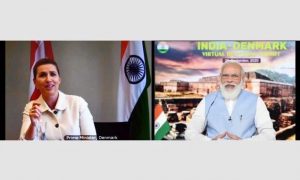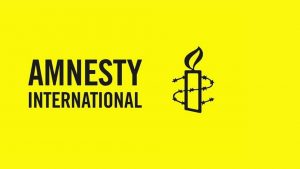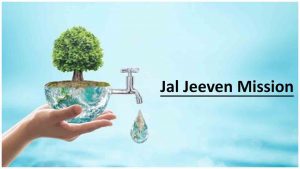Daily Current Affairs for Government Exams:
Today Current Affairs: 30th September 2020 for UPSC IAS exams, State PSC exams, SSC CGL, State SSC, RRB, Railways, Banking Exam & IBPS, etc
Table of Contents
Contents:
- Green Strategic Partnership
- Partnership for Maternal, Newborn, and Child Health:
- Amnesty International :
- .Jal Jeevan Mission
- Namami Gange Mission
- Other important current affairs
1.Green Strategic Partnership :

India and the Kingdom of Denmark have launched the Green Strategic Partnership for delivering sustainable solutions to India.
- The Ministry of Commerce and Industry has also signed a Memorandum of Understanding (MoU) for Intellectual Property (IP) Cooperation with Denmark.
Green Strategic Partnership:
- The Partnership will focus on expanding economic ties, green growth, and cooperation on global challenges such as climate change.
- Green growth is a term to describe a path of economic growth that uses natural resources in a sustainable manner.
- Danish companies with niche technologies and expertise have offered to help India in meeting its air pollution control targets, including in the key area of tackling the problem of burning crop stubble.
- Other key points under the partnership include dealing with the Covid-19 pandemic and cooperation in water efficiency and water loss.
- The creation of India-Denmark energy parks in areas with large numbers of Danish firms and an India-Denmark skill institute to train Indian manpower has been proposed.
- The Green Strategic Partnership will build on an existing Joint Commission for Cooperation and existing joint working groups.
Intellectual Property Cooperation:
- The MoU aims at increasing IP co-operation between the two countries by way of, exchange of information and best practices on processes for disposal of applications for patents, trademarks, industrial designs, and Geographical Indications, and cooperation in the field of protection of Traditional Knowledge.
- It will be a landmark step forward in India’s journey towards becoming a major player in global innovation and further the objectives of the National Intellectual Property Rights Policy, 2016.
2. Partnership for Maternal, Newborn, and Child Health:

The Union Ministry for Health and Family Welfare participated in the Partnership for Maternal, Newborn and Child Health (PMNCH) ‘Accountability Breakfast’ (an annual event) to discuss the issues of maternal and child health.
- The event was co-hosted by the White Ribbon Alliance (WRA) and Every Woman Every Child (EWEC).
- The theme of the Event: Protecting gains in Reproductive, Maternal, and Child Health from the COVID pandemic.
PMNCH
- The Partnership (PMNCH) is a global health partnership founded in 2005.
- It is hosted at the World Health Organization in Geneva, Switzerland which joins the maternal, newborn, and child health (MNCH) communities into an alliance.
- The Accountability Breakfast aims to convert talk into action for the health and rights of women, children and adolescents.
The White Ribbon Alliance
- WRA is a nonpartisan, non-profit, and non-governmental membership organization that aims to decrease maternal and newborn death globally.
- Founded in 1999 and the same year it came to India as WRA India
- Headquarters: Washington, D.C., USA
‘Every Woman Every Child’ (EWEC) Movement
- It was launched by the United Nations during the United Nations Millennium Development Goals Summit in September 2010.
- Every Woman Every Child is an unprecedented global movement that mobilizes and intensifies international and national action by governments, the private sector, and civil society to address the major health challenges facing women, children, and adolescents around the world.
At the national level, the Ministry of Health and Family Welfare has issued guidance to the States to ensure that women, children, and adolescents continue to get all the healthcare services even under severe strain due to the COVID pandemic.
3.Amnesty International :

Amnesty International India said the government had frozen all its bank accounts, leading to all of its work in the country coming to a halt.
- Amnesty International (AI) is a non-governmental organization with its headquarters in the United Kingdom focused on human rights.
- Amnesty draws attention to human rights abuses and campaigns for compliance with international laws and standards.
- Amnesty International was founded in London in 1961, following the publication of the article “The Forgotten Prisoners” in The Observer on 28 May 1961, by the lawyer Peter Benenson.
- The organization was awarded the 1977 Nobel Peace Prize for its “defense of human dignity against torture,” and the United Nations Prize in the Field of Human Rights in 1978.
Background:
- In the past five years, the government has taken action against several foreign donors including Compassion International, World Movement for Democracy (WMD), Greenpeace, etc on grounds of FCRA violations.
New Rules for NGOs under FCRA amendment, 2020:
- The Foreign Contribution (Regulation) Amendment Bill, 2020 was passed by the Parliament amending Foreign Contribution (Regulation) Act, 2010.
- In order to receive foreign funds, an NGO has to register with the Ministry of Home Affairs. It is assigned a unique FCRA registration number, to be renewed every five years.
- Every FCRA-registered NGO will have to open an FCRA-marked bank account with a designated branch of State Bank of India in New Delhi.
- The cap on administrative expenses has been lowered from 50% of foreign funds received to 20%.
- It prohibits the transfer of foreign grants received by an entity to a partner organization or an associated person, which is a usual practice.
4.Jal Jeevan Mission.:

Prime Minister Narendra Modi released the new logo for the Jal Jeevan Mission. He also unveiled the ‘Margadarshika for Gram Panchayats and Paani Samitis under Jal Jeevan Mission’ (Guidelines for the Village Panchayats and Water Committees) on the occasion.
- The Jal Jeevan Mission aims at providing every rural household in the country with a piped-water connection. The new logo of the Mission shall continue to inspire the need to save every drop of water.
- Referring to the Margadarshika, the Prime Minister said that they are equally important for the Gram Panchayats, people living in rural areas as well as for the Government machinery.
- Unlike the previous programs, Jal Jeevan Mission adopts a bottom to top approach, where the users and Paani Samitis (Water Committees) in the villages envision the whole project from its implementation to maintenance and operation.
- The mission has also ensured that at least 50% of the members of the water committee would be women.
- The Mardarshika Guidelines released today will guide the members of the Water Committee and Gram Panchayats in taking the right decisions.
- Prime Minister said a special 100-day campaign is being launched on 2nd Oct this year under Jal Jeevan Mission to ensure drinking water connection to every school and Anganwadi in the country.
5. Namami Gange Mission.:

Prime Minister Narendra Modi inaugurated 6 mega development projects in Uttarakhand under the Namami Gange Mission.
- He also inaugurated the Ganga Avalokan Museum, the first of its kind on the River Ganga at Haridwar.
- He released a book “Rowing Down the Ganges”.
- It explains in detail how the River Ganges stands as a glowing symbol of our Culture, Faith, and Heritage.
- He termed the Namami Gange Mission as the largest integrated river conservation mission which not only aims at the cleanliness of River Ganga but also focuses on the comprehensive upkeep of the River.
- The government is following a four-pronged strategy to achieve this objective:
- First- started laying a network of Sewage Treatment Plants (STPs) to prevent the wastewater from flowing into the Ganges.
- Second, The STPs were built by keeping in mind the demands for the next 10 – 15 years.
- Third – By making around a hundred big towns/cities and five thousand villages along with the River Ganga Open Defecation Free (ODF).
- And Fourth – By making an all-out effort to stop the pollution in the tributaries of River Ganga.
Other important current affairs:
1.Several states have complained about the growing crisis of Indian federalism.
- They have argued about the Ordinances and the Bills brought by the Centre which encroaches on their area of legislation, which is an assault on the federal structure of the Constitution.
- Federal Issues Raised by States:
- The refusal of the Central government of its legal commitment to compensate for Goods and Services Tax (GST) shortfall on account of lower revenue.
- The Centre argued that the lower revenues are the result of an “act of God” for which it cannot be held responsible.
- As per the GST Act, states are guaranteed compensation for any revenue shortfall below 14% growth (base year 2015-16) for the first five years ending 2022.
2.The Palghar administration has asked authorities to remain alert against a possible spread of the Congo fever in the Maharashtra district.
- Congo fever was first discovered in Crimea in 1944 and was named Crimean hemorrhagic fever.
- Later in 1969, scientists discovered that the pathogen responsible for causing Crimean hemorrhagic fever and the one that caused illness in Congo in 1956 was the same.
- Hence, the name changed to Crimean-Congo hemorrhagic fever.
- Crimean-Congo Haemorrhagic Fever (CCHF):
- Cause: The CCHF is a widespread disease caused by a tick-borne virus (Nairovirus) of the Bunyaviridae family.
- The virus is transmitted through the bite of the Hyalomma tick, an external parasite, living by feeding on the blood of mammals, birds, etc.
- It can also be contracted through contact with viraemic animal tissues (animal tissue where the virus has entered the bloodstream) during and immediately post-slaughter of animals.
- Human-to-human transmission: It can occur resulting from close contact with the blood, secretions, organs, or other bodily fluids of infected persons.
- Symptoms: Fever, muscle ache, dizziness, neck pain, backache, headache, sore eyes, and photophobia (sensitivity to light). There may be nausea, vomiting, diarrhea, abdominal pain and sore throat early on, followed by sharp mood swings, confusion, depression, and liver enlargement.
3.Defence Minister Rajnath Singh launched the Defence India Startup Challenge (DISC 4) during the iDEX event, featuring the initiatives aimed at expanding the horizons of Innovations for Defence Excellence (iDEX) ecosystem in New Delhi.
- Mr Singh also launched the iDEX4Fauji initiative and Product Management Approach (PMA) guidelines during the event.
- iDEX4Fauji is a first of its kind initiative, launched to support innovations identified by members of the Indian Armed Forces and will bolster frugal innovation ideas from soldiers and field formations.
- The iDEX initiative stands out as one of the most effective and well-executed defense Startup ecosystem created in the country.
4.The Vice President, Venkaiah Naidu emphasized the importance of a healthy body and healthy mind saying “we have to follow the concepts of “Dinacharya” – daily regimes and “Ritucharya” – seasonal regimes to maintain a healthy life.
- Ritu, the season, classified by different features expresses different effects on the body as well as the environment.
- Ayurveda has depicted various rules and regimens (Charya), regarding diet and behavior to acclimatize seasonal enforcement easily without altering body homeostasis.
- The prime principle of the Ayurvedic system of medicine is a preventive aspect, can be achieved by the change in diet and practices in response to change in climatic conditions.
5.International Translation Day is being celebrated on 30 September.
- International Translation Day is meant as an opportunity to pay tribute to the work of language professionals, which plays an important role in bringing nations together, facilitating dialogue, understanding etc.
- On 24 May 2017, the UN General Assembly adopted resolution 71/288 on the role of language professionals in connecting nations and fostering peace, understanding and development, and declared 30 September as International Translation Day.
- 30 September celebrates the feats of St. Jerome, the Bible translator, who is considered the patron saint of translators.Jerome was a priest from North-eastern Italy, who is known mostly for his endeavor of translating most of the Bible into Latin from the Greek manuscripts of the New Testament. Jerome died near Bethlehem on 30 September 420.
6.Serum Institute of India (SII) has received funds from Gavi, the Vaccine Alliance, and the Bill and Melinda Gates Foundation, which would allow it to double its supply of Covid-19 vaccines (200 million doses) to India and other poorer countries as part of the Gavi COVAX facility. The vaccines will be priced at a maximum of USD 3 per dose.
- SII (Pune), the world’s largest vaccine manufacturer by volume, has agreements to manufacture Covid-19 vaccines, Covidshield (currently under clinical trials) developed by American vaccine maker Novavax, as well as Oxford University in collaboration with Swedish-British drugmaker AstraZeneca.
- COVAX is one of three pillars of the Access to COVID-19 Tools (ACT) Accelerator, which was launched in April 2020 by the World Health Organization (WHO), the European Commission, and France in response to the Covid-19 pandemic.
7.The United Arab Emirates (UAE) has decided to send an unmanned spacecraft to the moon in 2024.Name: The rover would be named Rashid after Sheikh Rashid bin Saeed Al Maktoum, one of the original founding rulers of the UAE.
- Rover is a vehicle for exploring the surface of a planet or moon.
- The rover will explore the surface of the moon in areas that have not been explored previously by human missions such as NASA’s Apollo.
- Participating in the moon exploration is part of the UAE’s space strategy to build new knowledge capabilities and advance the country’s scientific, technical and research environment.
- If successful in 2024, the UAE could become the fourth nation to land a spacecraft on the moon after the USA, the former Soviet Union and China.
- India, Israel and Japan have tried but failed in landing a spacecraft on the moon.
- Planned to land on the South Pole of the Moon, Chandrayaan-2 was launched by India in 2019.
- However, the lander Vikram hard-landed, which crushed India’s dream to become the first nation to successfully touch down on the lunar surface in its maiden attempt.
- India has planned a new moon mission named Chandrayaan-3.
- It is likely to be launched in early 2021.
- It will be a mission repeat of Chandrayaan-2 and will include a Lander and Rover similar to that of Chandrayaan-2, but will not have an orbiter.
- Artemis is a crewed spaceflight program of NASA that has the goal of landing “the first woman and the next man” on the Moon, specifically at the lunar south pole region by 2024.




